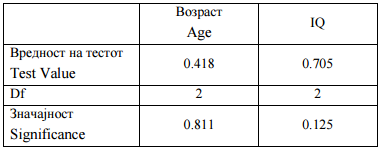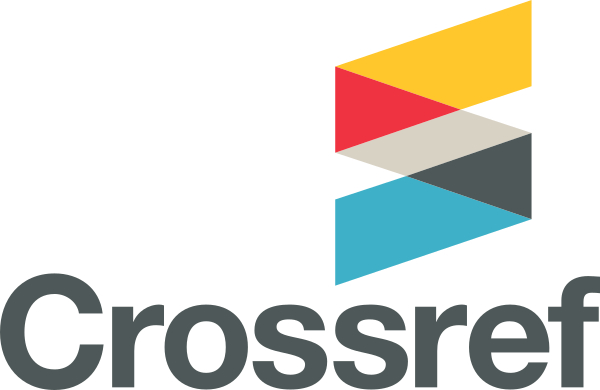JSER Policies
JSER Online
JSER Data
Frequency: quarterly
ISSN: 1409-6099 (Print)
ISSN: 1857-663X (Online)
Authors Info
- Read: 48343
|
СЕМАНТИЧКА ВЕРБАЛНА ФЛУЕНТНОСТ НА БИЛИНГВАЛНИ ДЕЦА СО ЛЕСНА МЕНТАЛНА РЕТАРДАЦИЈА
Ненад П. ГЛУМБИЌ 1
Србија |
|
SEMANTIC VERBAL FLUENCY OF THE BILINGUAL CHILDREN WITH MILD INTELLECTUAL DISABILITY
Nenad P. GLUMBIKJ 1
Faculty of Special Education and Rehabilitation, Belgrade, 1 Serbia |
|
|
|
|
|
Вовед |
|
Introduction |
|
Тестовите на вербалната флуентност се користат за процена на когнитивните способности од 1943 година кога Терстон (1) почнал да ги користи како составен дел од батеријата тестови за процена на менталните способности. Од тогаш тестовите за процена на вербалната флуентност станале значаен клинички инструмент во невропсихолошката процена. (2) Ние немаме многу информации за постигнувањата на билингвални испитаници на овие јазични тестови. Во случајот на билингвални деца со лесна ментална ретардација нормативните податоци се уште повеќе сиромашни. |
|
Verbal fluency tests have been used to assess cognitive abilities since 1943, when Thurstone (1) introduced them as part of a battery of mental ability tests. Since then, verbal fluency tests have become important clinical tools in neuropsychological assessment (2). However, we do not have much information on performances of bilingual participants on these language tests. In the case of the bilingual children with mild intellectual disability, normative data are even sparser.
lobe is activated in phonemic generation whereas temporal lobe is more active in semantic generation of words (4). It was also found that left versus right hemispheric asymmetry of activation was greater for letter than for semantic cues (5).
ronal structures. In some cases, one might find out molecular basis for this kind of impairment. It is currently thought that fragile X syndrome (FraX; the most common inherited form of intellectual disability) results from having more than 200 cytosine–guanine–guanine (CGG) trinucleotide repeats. It was also considered that premutation carriers (with 55–200 CGG repeats) are unaffected. However, it was recently found (7) that premutation carriers had significant impairments on test of executive function (among them is the verbal fluency test). The authors suggest that CGG trinucleotide repeats in the premutation range affect specific neuronal circuits that are concordant with specific neuropsychological deficits. |
|
дека фронталиот резен се активира на фонемската продукција, додека темпоралниот резен е мoжнo поактивен во семантичка продукција на зборови. (4) Исто така е утврдено дека асиметрија во активацијата на левата хемисфера во однос на десната е поголема во задачите со букви отколку во семантичките задачи. (5) |
|
|
|
се одразуваат суптилни оштетувања на невроанатомските структури. Во некои случаи можно е да се установи молекуларната основа на овие оштетувања. Денеска се смета дека синдромот на фрагилниот Х-хромозом (најчеста наследна форма на интелектуалната попреченост) е поврзан со повеќе од 200 цитозин-гванин-гванин (ЦГГ) тринуклеотидни парови. Исто така, се смета дека премутационите носители (со 55-200 ЦГГ парови) немаат изразена клиничка слика. Неодамна е установено (7) дека премутационите носители имаат значајни оштетувања на тестовите за испитување на егзекутивните функции, а меѓу нив и на тестовите за процена на вербалната флуентност. Авторите на оваа истражување сметаат дека ЦГГ тринуклеотидните парови во премутациониот опсег погодуваат специфични неврални кругови што има за последица и специфични невропсихолошки дефицити. |
|
|
|
Метод на истражување |
|
Methods of the research |
|
Примерок |
|
Research participants |
|
Примерокот чини 90 испитаници со лесна ментална ретардација, двата пола, на возраст меѓу 12 и 15 години. Сите испитани деца посетуваат училишта за деца попречени во менталниот развој, во кои наставата се изведува исклучиво на српски јазик. Целиот примерок е поделен на три потпримероци: 30 монолингвални испитаници кои говорат на српски јазик. (M1), 30 монолингвални Роми кои не говорат ромски, туку само српски јазик (M2) и 30 билингвали од ромска националност кои говорат и српски и ромски јазик (Б). Значајноста на разликата меѓу компарираните потпримероци во однос на возраста и општото когнитивно ниво е испитана со Крушкал-Волис-тестот. Резултатите прикажани во табелата број 1 покажуваат дека компарираните потпримероци се изедначени во однос на коефициентот на интелигенцијата и возраста. Ниедно дете, што сме го испитале, нема ни невролошки оштетувања ни дуална дијагноза. |
|
The sample consisted of 90 participants with mild mental retardation, of both sexes, aged from 12 to 15. All tested children attend the schools for the children with intellectual disabilities in which the school lectures are delivered exclusively in Serbian. The whole sample was divided into three subsets: 30 monolingual Serbian children (M1), 30 monolingual Roma children who do not speak Romany (M2) and 30 bilingual Roma children who speak both, Romany and Serbian language (B). The significance of the difference between compared subsets regarding age and general cognitive ability was estimated by Kruskal-Wallis test. The results presented in Table 1 show that the subsets compared were equalized by the coefficient of intelligence and age. None of the children had neurological impairments or dual diagnosis. |
Табела 1. Значајност на разлика меѓу три подпримерока во однос на возраста и IQ
Table 1. Significance of the difference between three subsets regarding age and IQ

|
Техники и методи на испитување |
|
Materials and methods |
|
Способноста на семантичка флуентност испитана е со користење на поттестот "Вербална флуентност# од Мекартијевата скала за процена на детските способности Сите испитаници се тестирани на српски јазик. |
|
The ability of semantic fluency was estimated using Verbal fluency subtest of the McCarthy Scale of Children's Abilities. All participants were tested in Serbian language. |
|
Од секој испитаник е побарано да ги наведе сите прехранбени продукти за кои може да се сети во рок од 20 секунди. За секој точен одговор испитаникот добива по еден поен. |
|
They were asked to tell the examiner all the food items they can think of in 20 seconds. One point was given for any item. Both general category as well as specific exemplars was given credit. Repeated responses were counted only once. The same procedure was conducted for animals, clothes and transportation devices. Each child could score maximum 9 points for each of the four categories, i.e. 36 points for the whole subtest. |
|
|
|
|
|
Резултати |
|
Results |
Табела 2. Постигнувања на монолингвални и билингвални деца на тестот за процена на вербална флуентност
Table 2. The achievements of monolingual and bilingual children in the Verbal fluency test

|
Најголемиот број монолингвални деца остваруваат повеќе од 30 поени на тестот за процена на вербална флуентност. Наспроти тоа, повеќе од една третина на билингвални испитаници припаѓа во групата на деца со најниски постигнувања (меѓу 15 и 21 поен). Ниеден билингвален испитаник не остварува највисоки скорови ( од 30 до 36 поени ).
|
|
The largest number of monolingual children achieves more than 30 points in Verbal fluency test. In contrary, more than one third of bilingual participants belong to the group with the lowest achievement between 15 and 21 points. None of the bilingual children obtain the highest scores (30-36 points). |
Табела 3. Значајност на разликата меѓу монолингвалните и билингвалните децана тестот на вербалната флуентност (Шефеов тест )
Table 3. Significance of the difference between monolingual and bilingual children in the Verbal fluency test (Scheffe test)

|
Двете групи на монолингвални испитаници постигнуваат подобри резултати од билингвалните деца со лесна ментална рeтардација. Не е потврдена сигнификантна разлика меѓу монолингвални деца, кои припаѓаат на српската и ромската етничка заедница (p>0.05). |
|
Both groups of monolingual children attain significantly better results than bilingual children with mild intellectual disability. There is no significant difference between monolingual children of Serbian and Roma ethnicity (p>0.05). |
||
|
|
|
|
||
|
Дискусија |
|
Discussion |
||
|
Испитаници кои говорат на различни јазици можат да користат различни когнитивни стратегии, кога се присетуваат на зборовите во текот на решавањето на задачите за процена на вербалната флуентност. Извесни семантички полиња можат да се разликуваат кај лицата кои во детството ги научиле двата јазика. Категориските задачи ќе бидат поефикасно направени на мајчиниот јазик, со обзир на тоа дека зборовите на мајчиниот јазик мемориски се складираат спрема нивното значење. Розели го испитувала влијанието на билингвизмот на вербалната флуентност (11). Билингвалите биле помалку продуктивни од монолингвалите кога е барано од нив да наведат што повеќе животни на другиот јазик. Разликите во користените стратегии би можале да укажат на разликите во лексичката организација во разните јазици. Другото плаузабилно објаснување на оваа разлика се однесува на тоа дека кај билингвалните испитаници, први на решавањето на задачите на вербалната флуентност на другиот јазик, доаѓа до интерференција меѓу двата јазика. Повеќето ромски деца не говорат адекватно ни ромски ни српски јазик. |
|
Speakers of different languages might use different cognitive strategies when recalling words in a verbal fluency task. Some semantic fields may differ in people who learned both languages in childhood. A categorical cue will be more effective for the native language because the native language words are stored by meaning. Rosseli (11) examined the impact of bilingualism on verbal fluency. Bilinguals were less productive than monolinguals in the generation of animals using the second language. Differences in strategies may suggest differences in lexical organization across languages. The second plausible explanation of this difference is that bilingual participants experienced interference between the two languages when performing semantic category fluency task in the second language. |
||
|
Недоволното познавање на двата јазика, значи овие деца, всушност, не се двојазични, туку се двоструко полујазични. Некои автори наведуваат дека билингвалните испитаници постигнуваат подобри резултати на задачите на семантичката флуентност, ако се тестираат на мајчиниот јазик. Се чини дека таквите испитаници имаат посолидна семантичка база во својот примарен јазик (11). Наспроти тоа, двојазичните деца кои недоволно ги познаваат двата јазика, немаат можност да установат сигурна лингвистичка основа за продукција на зборовите. Развојните карактеристики на билингвални деца со лесна ментална ретардација, во најголем број на опсервираните параметри, не отстапуваат од развојните постигнувања на монолингвалните деца на иста возраст и ниво на интелигенција (12). Исто така е установено дека прагматската компетенција на ромските билингвални деца значајно е подобро развиена од прагматската компетенција на монолингвалните деца на иста возраст и количник на интелигенција (13). Освен интелектуалниот дефицит кај овие деца основен проблем претставува и нивниот недоволен јазички развој. Резултатите од истражувањата покажуваат (14) дека поддршката која училиштето ја дава во развојот на мајчиниот јазик, е многу значајна за поттикнување процесот за усвојување на јазикот. Знаењата, верувањата и ставовите на наставниците и членовите на семејството, се од особена важност за поттикнување или оневозможување на учениците во процесот за усвојувањето на мајчиниот јазик. Тоа е и причината поради која е потребно да се создадат индивидуализирани планови за давање поддршка на секое двојазично дете со лесна ментална ретардација и да пронајдеме начин да го разрешиме небалансираниот билингвизам. |
|
|||
|
|
|
|
||
|
Заклучок |
|
Conclusion |
||
|
На тестот за процена на семантичката флуентност билингвалните деца со лесна ментална ретардација постигнуваат послаби резултати во однос на монолингвалните испитаници. Со обзир на фактот дека сите три потпримероци се изедначени по возраста, количникот на интелигенција и нивото на образование, јасно е |
|
Bilingual children with mild intellectual disability obtain worse results in semantic fluency test than monolingual children. Due to the fact that all three subsets were matched on age, intelligence and educational level, it is obvious that insufficient |
||
|
дека недоволното познавање на јазикот, е главниот фактор за неуспехот на овие деца на тестот за процена на семантичката флуентност. |
|
language knowledge should be seen as a main factor that contributes to the failure of these children in semantic fluency test. |
||
|
|
|
|
||
|
|
|
|
||
|
Citation:Glumbikj PN, Bozhinovikj MA. Semantic Verbal Fluency of the Bilingual Children with Mild Intellectual Disability. J Spec Educ Rehab 2005; 6(1-2):99-108. |
||||
|
|
||||
|
Литература/References |
|
|
||
|
|
|
||
Share Us
Journal metrics
-
 SNIP 0.059
SNIP 0.059 -
 IPP 0.07
IPP 0.07 -
 SJR 0.13
SJR 0.13 -
 h5-index 7
h5-index 7 -
 Google-based impact factor: 0.68
Google-based impact factor: 0.68
10 Most Read Articles
- PARENTAL ACCEPTANCE / REJECTION AND EMOTIONAL INTELLIGENCE AMONG ADOLESCENTS WITH AND WITHOUT DELINQUENT BEHAVIOR
- RELATIONSHIP BETWEEN LIFE BUILDING SKILLS AND SOCIAL ADJUSTMENT OF STUDENTS WITH HEARING IMPAIRMENT: IMPLICATIONS FOR COUNSELING
- EXPERIENCES FROM THE EDUCATIONAL SYSTEM – NARRATIVES OF PARENTS WITH CHILDREN WITH DISABILITIES IN CROATIA
- INOVATIONS IN THERAPY OF AUTISM
- AUTISM AND TUBEROUS SCLEROSIS
- THE DURATION AND PHASES OF QUALITATIVE RESEARCH
- REHABILITATION OF PERSONS WITH CEREBRAL PALSY
- DISORDERED ATTENTION AS NEUROPSYCHOLOGICAL COGNITIVE DISFUNCTION
- HYPERACTIVE CHILD`S DISTURBED ATTENTION AS THE MOST COMMON CAUSE FOR LIGHT FORMS OF MENTAL DEFICIENCY
- DIAGNOSTIC AND TREATMENT OPTIONS IN AUTISTIC SPECTRUM DISORDERS – AN OVERVIEW
















